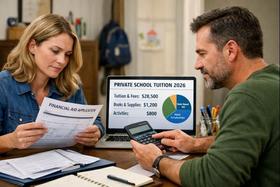On March 1, 2020, the Coronavirus or COVID-19, as it is named, has begun spreading worldwide. In the opinion of most reliable news reports, it is only a matter of time before the virus spreads widely here in the United States.
I am writing this article with small to medium size private schools in mind. Larger schools will have health professionals on staff or on call. For a variety of reasons, mainly financial, small schools won't have these health resources readily available on site.
I am not a health expert. What I have done here is to gather all the information I can from trusted sources such as the World Health Organization to help you cope with the virus. I strongly recommend that you monitor your state and local government's recommendations and advice, as well as information from the Centers for Disease Control and Prevention.
Suggestions for families
I offer these suggestions from the perspective of a parent and grandparent. We have so much contact with people in our daily lives. We touch so many surfaces and never give it another thought. Unfortunately, we all have to rethink how we behave with a dangerous contagion such as COVID-19 lurking who knows where. For example, I now wipe the handle of the shopping cart with a sanitary wipe when I go to the supermarket. Most stores seem to have sanitary wipes by their entrances. Use them. I don't shake hands or kiss people on the cheek anymore. Old habits do die hard. I really have to think proactively about protecting myself. So should you.
Here are some sensible precautions to take.
- Do not send a sick child to school or anywhere else in public.
- Do not shake hands with strangers. Do elbow butts.
- Do not air kiss or hugs strangers. Use a verbal greeting.
- Avoid crowded situations such as public transportation and elevators.
- Wash hands often. Use hand sanitizer when you cannot wash hands.
- Keep your distance from strangers, especially somebody who is coughing or sneezing. The COVID-19 virus spreads by droplets in the air and on surfaces such as railings, handles, buttons, etc.
- Use your elbows to press buttons in public places.
This video from the World Health Organization offers practical advice on how individuals can cope with the Coronavirus.
Avoid traveling to places known to have active cases of Coronavirus. For example, both China and Italy report many instances of COVID-9. The problem is that you may decide to travel to a city in either of those countries and have no difficulties while you are there. Returning to the United States will more than likely be problematic as you will face screenings and possible quarantine. The typical quarantine period seems to be fourteen days. When you are quarantined, you may not go to work, see your family and friends. You are isolated to prevent the spread of the virus.
This video from LifeCo explains how to protect yourself when you travel.
Suggestions for schools
I'll cut to the chase here. The Washington State Department of Health has some suggestions which I quote as follows:
"What should I do if I suspect a student, staff member, or volunteer is at risk for COVID-19?
If a student, staff member, or volunteer meets the above criteria, it is important to place them in a private room away from others and ask them to wear a face mask. Immediately notify your local health department. They will provide you with guidance."
"What can I do to prevent COVID-19 infections in my school?
Schools do not need to take any special precautions beyond what is normally recommended to prevent the spread of viruses in schools. You can help students and staff reduce their risk of getting and spreading viral respiratory infections, including the flu and the common cold, by encouraging them to take simple steps which will also prevent COVID-19. These include:
- Staying home when they are sick.
- Frequent handwashing with soap and water for at least 20 seconds, especially after going to the bathroom, before eating, and after they blow their nose. Help young children do the same. If hands are visibly dirty, use soap and water to clean hands.
- If soap and water are not readily available, using an alcohol-based hand sanitizer with at least 60% alcohol.
- Advising persons to avoid touching their eyes, nose, and mouth with unwashed hands.
- Following the school's routine cleaning and disinfection program. Emphasizing to clean and disinfect frequently touched objects and surfaces.
- Covering coughs or sneezes with a tissue, then throwing the tissue in the trash and cleaning hands with soap and water or hand sanitizer (if soap and water are not readily available).
- Urging students and staff to get a flu shot during the flu season.
- Providing adequate supplies for good hygiene, including clean and functional handwashing stations, soap, paper towels, and alcohol-based hand sanitizer."
"Cleaning and Disinfecting Procedures
Special processes beyond routine cleaning are not necessary nor recommended to slow the spread of respiratory illness. Schools should follow standard procedures for cleaning with third-party certified “green” cleaners and disinfecting with an Environmental Protection Agency (EPA) registered disinfectant with a claim for human coronaviruses. Typically, this means daily sanitizing surfaces and objects that are touched often, such as bathrooms, water coolers, desks, countertops, doorknobs, computer keyboards, hands-on learning items, faucet handles, phones, and toys."
"Disinfecting is the responsibility of school custodial staff. They are trained to use disinfectants in a safe and effective manner and to clean up potentially infectious materials and body fluid spills – blood, vomit, feces, and urine. Contact your custodian or school nurse if students are ill and your classroom needs cleaning and disinfection.
Clean the surface first to remove all organic matter. Custodial staff should follow the disinfectant manufacturer’s instructions for use including:
- Using the proper concentration of disinfectant
- Allowing the required wet contact time
- Paying close attention to hazard warnings and instructions for using personal protective items such as gloves and eye protection
- Using disinfectants in a sufficiently ventilated space"
The Centers for Disease Control and Prevention offers an authoritative checklist, Pandemic Flu Checklist: K-12 School Administrators. Print out a copy and keep it handy for quick reference.
The Bottomline
In 1736, Benjamin Franklin made great sense when he advised that "An ounce of prevention is worth a pound of cure." As head of your school, be patient with parents and students who don't understand the danger of COVID-19. Be vigilant at all times. Be firm when dealing with staff, students and others who try to attend school when they are sick or claim that they just have the sniffles. Once again, stay alert and aware of your state and local government instructions. Those professionals have access to data and information that drives their decisions and instructions. Be safe.
Questions? Contact us on Facebook. @privateschoolreview

-8okvj5w8m60w0ws40oocok84w-462.jpg)










